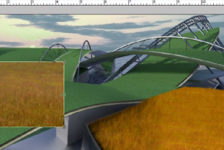Smart people across the world have been using nature’s gifts for thousands of years. Rain, as you could probably tell, is one of those gifts. The first documented rainwater harvesting was in Ancient China . Should you finally clean your gutters and follow the example to collect rainwater for landscaping use as well? Most probably yes and here is some pretty good argumentation:
Rainwater is free
There’s no such thing as free lunch – that applies to most lunches, but not to the rain. Taking advantage of resources falling from the sky is the smartest thing you would ever do. Having a barrel or two at your yard will let you store some fresh rainwater goodness for later landscaping use. Bear in mind that the barrels will get filled very quickly during a heavy pour.
Your plants will positively like you more as their owner
Rainwater is the key to healthier plants. It contains all kids of silly goods for your plants. Vital minerals, vital microorganism and other vital stuff are all part of what rainwater can provide your beautiful flowers and veggies with. Sometimes, up in the sky, during the rain, occurring lightning happens to enrich the rainfall with nitrogen additions by converting them from the atmospheric nitrogen up there. This is welcome to your plants’ needs, because nitrogen and carbon are the two main nutrients your green friends need to survive. Of course, the water should not end up in your belly, but I’m assuming you already know that. Besides for watering you can use the rain for basically whatever you need water for as long as it’s not drinking.
Your soil will also be eternally grateful to you
There’s this phenomena called salt build up that occurs in the soil when it’s being treated with regular sink water often or if it rains rarely. Salt is bad for the soil. Rainwater’s advantage here lies in its nature: if it’s up in the sky this means it evaporated to get there. Evaporation’s one effect is that it purifies and leaves the bad guys behind. Naturally purified water won’t create salt issues for the soil and your plants will be able to enjoy its full nutritive potential.
Pro tip: A thing called rain garden exists. It’s a garden with special irrigation system designed to use rainfall. Extensions to the rain gutters are being placed slightly underneath your garden’s surface. If you live somewhere rainy and are up for the challenge you should definitely consult with your local rain gutter experts before doing any modifications on your gutters.
Bonus tip: There’s this other option for even irrigation with rainwater – bury a clay pot halfway somewhere around the plants you want to water and pour the rainwater in it(or let the rain do the job). Clay is porous and will slowly but surely water your plants without depriving nor over watering them.
Collecting rain water for landscape use is justified in so many ways it would be a sin not to at least take it under consideration if you are a devoted gardener and home owner. Nature knows you need its divine intervention in your gardening ways so it sends you this wonder – the rain. Don’t hesitate and take advantage of this kind helping hand.
Published in Blog








